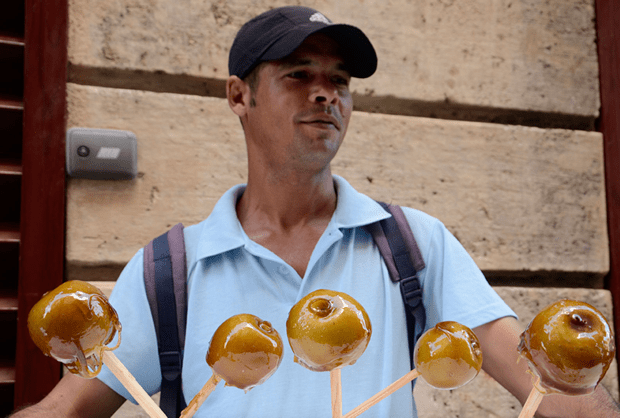Since the easing up on the regulations for self-employment at the end of 2010 in Cuba, the number of self-employed workers registered a sharp increase: from just over 150,000 to nearly 400,000, according information made available in November 2012. However an analysis of the statistics shows a slowdown in the growth trend in recent months. According to figures for the first half of 2012, about 30 percent of nationwide licenses were returned.
Four out of five small businesses fail in the world before turning five years old, according to international organizations. Without a doubt, building a business effectively is not a matter “piece of cake”
To begin with, people might say is all about knowing how to produce something or provide a service. It is also necessary to turn such activity into a profit generating process. It’s that simple for some, and tough for others.
Generally, small business owners blame their failure on external factors, such as the little official support, high taxes and difficulties in accessing credit.
However, many analysts say its unpreparedness to address specific issues of sales, operations, control, planning or management resulting fatally in the high “infant mortality rate” of micro, small and medium enterprises.
Do I prefer growth or profitability? What, how much and when to invest? What market segment am I going into? These and many others are simple questions that require complex assessments by small entrepreneurs. How Cuban private entrepreneurs making such decisions?
Probably a good place to start an approach to such issues is the stage where they receive accreditation allowing them to legally start their journey in business.
Nothing ventured…
It’s early and a crowd clumps against the Municipal Labor and Social Security headquarters in the municipality Revolution Square in the capital.
In an office that is accessed by a somewhat labyrinthine hallway, there are two types of procedures related to licenses for self-employment: some receive them, others return them. In few meters you meet the disappointment of those who could not get ahead and resign, and the optimism of those who start their career in the private business.
Sitting in a doorway is Douglas Miranda, who concluded a few months ago his military mandatory service. When he finished it he sought what to do. He got a machine to produce ice cream. It seemed a good choice, since he could place it a short walk from Linea street where there is a school and a hospital. But his enthusiasm was deflated in just 15 days. He is giving his license back.
“I’m still figuring out what had happened. Is there no money in the street? The purpose of this is not to become a millionaire, but to survive. But if I keep it stubbornly, what I will get will be a 1000 pesos electricity bill, and I will not have enough to pay it “he expresses his concern.
Beside him is Elisa Rodriguez, a retired woman. She gave up on her café located at Avenue 26, in Nuevo Vedado neighborhood. After three months of dealing with it, she had less and less sales.
“Even the little money I get from my pension I had it committed to the cafeteria” she explains. What hits you the most is the supply instability, because one is selling and needs to know if they are now selling cheaper mayonnaise in the store. Now I could rent the porch, to see if I have better luck. ”
The difficulty in acquiring supplies, in this case for making jewelry, also discouraged Eddy Alvarez: “My sales were not bad. With stable raw materials it would have worked, but paying 300 pesos monthly tax it did not, “he complains. He worked for five months in a porch on Paseo Street. He produced some of his merchandise, but when he ran out of raw materials such as different types of wire, string and seeds, he couldn’t find a stable supplier and his chances to continue went down the drain.
A short walk from Eddy, as he “hangs the gloves” with its hardware store, the young couple who are Alberto Machado and Mileydis Guanche seems to pick them up. They intend to test the sale of jewelry. Between the two made an investment of 2500 pesos to buy goods. “The thing is to test, they say it is very competitive, but we have a month before having to pay taxes. If not, we turn back the license, “they comment.
Improvisation of some is offset by others’ best preparation like in the case of Yersey Martinez, who with 10 years experience in hairdressing, optimistically speaks on the preparations he is making to open his own salon.
“I think I will do well. In this paper, the crux is professionalism. If you do things as they are supposed to be done, people will come back and you earn their trust. ”
What conditions have you prepared to launch the hairdresser?
“I sent for a head watcher, had to be plastic, not the ideal one, but it is good, and I bought a chair. Right now, that allows me to start. If tomorrow there are more facilities, I will think of something better. In my neighborhood, every two blocks there is a hairdresser and prices are more or less standard. However, this is a creativity job and I can develop masks, haircuts. To succeed it is important that you offer the customer convenience and have details of care, such as providing a coffee to those who arrive. ”
Yersey’s right, sometimes the difference is in the details, and also in hard work. This last was clear to Antonio Socarras, who since last February manages a cafe on Ayestarán Avenue in Havana.
At the back of the establishment, a picture showing a dagger crossing a cursing tongue and eyes. He addresses Antonio, its employees and customers who come with a necessary statement: “Aché pa ‘ti’. Apparently, on several occasions that was needed.
“There are a lot of instability in the raw materials and sales, and sometimes the accounts are in red, he says. We had difficult times in July and August. But we must find solutions and remove from menu offers that are causing us to lose. I had to remove, for example, almost all flour-based products, only kept croquettes. The thing is to keep fighting and remain open. ”
Have you thought about expanding your business?
“As I am so far, I am doing well. Finding a bigger place would bring me more problems, more workers, more taxes … First you have to achieve stability in sales, because competition is there, you feel it. When they open new business in the neighborhood, they really go with everything they have, but then they decay. But you have to continue offering the best. If profits fall, you cannot begin to skimp on the box. Instead, you have to decorate it even more, and at the same price. ”
Looking for more opinions on how to get a successful business in the field of gastronomy, we chatted with Ruben, a man in his 50s who prefers to keep his surname secret. He owns a small cafe in Santiago de Las Vegas, which is enhanced by the large sign of offerings at the door.
Sitting on a nearby park bench, he invites us to look around. At a glance we can see half a dozen individuals cafes that sell pizzas. “You see them?” he asks us. “We are all subsisting. Talking of consolidated businesses is an overkill. Profit margins are down. Of course, everyone is selling more or less the same, less than 100 meters from each other. ”
Getting the customer to distinguish between your products and the competition’s is without doubt a clear need in the emerging field of personal initiatives. Perhaps one of the clearest examples is that of those technology addict youngsters who started the Clinic Cell, an incipient network of mobile phone repair that spreads through the city. Running one of them, located in a garage in the Vedado’s G Street, Javier Matos, with studies in computer science and design, can be considered a true entrepreneur.
“So far we are three, one group, he explains. We do everything with the same marketing technique, although each has its separate license. We wanted to leave the workshop concept behind; therefore we used the clinic name. In a clinic they try to save you, you never arrive and they reject you. When we went to open new clinics, we analyze the problems with the first, mainly in terms of promotion. So we created our logo, hand out cards, we sent messages to many people’s mobiles, we advertise at parties, put stickers on cars of friends. Where possible, we put our message. ”
How do you see your future in this business?
“People follow technology and there is always demand. But many cell repairing shops have opened and the competition is paramount. Some people are using our name, we have to defend copyright. But I imagine tomorrow with more possibilities, with contracts with the state and, why not, competing against Cubacel. ”
 To avoid losing track of your business
To avoid losing track of your business
When we contrast positive and negative examples of private ventures, it acquires great importance the expertise and knowledge of micro-entrepreneurs to identify business opportunities and optimize their resources.
To better understand how all that is possible we talk with Damien Echevarría. Before the age of 30, he already has an academic background that includes a BA in Economics, four years of teaching in higher education and a Masters in Business Administration. Such curriculum would probably will be enough to grant him a position in a major enterprise, however, with an economist rationality he chose the self-employment. When people return home and prepare to enjoy while watching television, he knocks on their doors to offer DVDs with telenovelas, films, concerts and documentaries.
He talks about his first steps in the private sector with awareness that some will think overflows his current occupation, but he is of the opinion that, big or small, you have to take care of the business and understand it as a science.
“Sometimes I amazes me how all that I studied at the university applies in a business like mine, he says. However small it should run like a company. I have current competitors, potential competitors, suppliers, customers, and interact with them. Bring in logistics, accounting, finance, cash, receivables, payables and more aspects. ”
What failures have you observed self-employed people incur into?
“It is very difficult to generalize, but I have seen many who dumped all their money in the investment and have no working capital, which is used to fund daily operations. People think it all gets down to start the next day but probably they don’t sell enough, and you have to keep paying for raw materials to the supplier, etc. Hence the tendency of trying it for a short while and then give back the license. But who knows you in a month, two or three, at a time when everyone is coming to market? To achieve customer loyalty you have to work longer, keep trying, changing products, cut down your losses. So in some countries a period of tax exemption is decreed.
“On the other hand, especially in the area of cafes, you can easily notice that there are places where the investment amount does not reflect on a guaranteed sales level. One wonders: why making it so luxurious if hardly anyone stops here? My opinion is that we must be sure of the demand, and maximize investment. That means investing as little as possible to raise a lump sum. Then, if things go well, in the future, you expand, in order to get some money that will serve as working capital and reinvestment. ”
How can the ability to access bank loans impact on the way small businesses grow?
“they open up interesting possibilities. There are exercises that demonstrate how to increase the profitability of the money you invest when you also use certain credit levels. Because if you work with 100 percent equity, profitability is lower than if you access a loan amount. One can calculate an optimum point, which at best is 40 or 50 percent of credits; it all depends on the activity.
“Until now people have started basically with pocket money, but the credits can boost larger activities. Let’s say I can think of assembling a simple mini-parts factory, and I do the math: four modern lathes and some milling. Human capital is there. But that’s an investment of tens of thousands of dollars. Let’s agree five people ask a loan from the Bank to finance 40 percent. But I need the state to import the machinery and certain raw materials, because I have no import license. That kind of production of intermediate goods is essential. But they are more difficult and require state support. But if we do not think that way, we won’t get rid of small lousy business “.
In the context of the evolution of the national economic scenario it seems crucial that the self-employed take clearer decisions control their accounting and be aware of key dimensions of business management. But the authorities also gain prominence in fostering private activities that more organically can be included in development strategies. Because somehow, with each person who is discouraged by the difficulties of getting ahead, society loses a breath of vitality that benefits everyone.
Photos: Beatriz Verde Limón / Alain Gutiérrez










